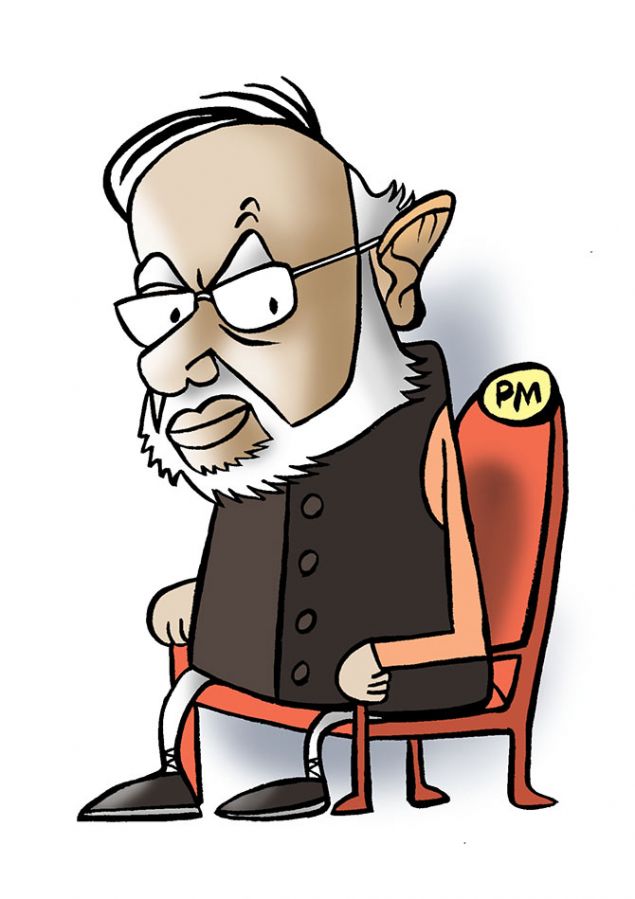'Differences will almost certainly arise over how the minorities are to be viewed and how educational institutions are to be treated.'
'These issues would be non-negotiable for Mr Modi's BJP.'
'So he may well refuse to lead a government in which his freedom of action is constrained by others in the coalition,' feels T C A Srinivasa-Raghavan.
Illustration: Uttam Ghosh/Rediff.com

Narendra Modi has had an extraordinary political career since he became chief minister of Gujarat in October 2001. He won three successive assembly elections there, with handsome majorities each time.
He used to run the state in an uncompromising way -- at one stage, it is believed, somewhat alienating the RSS also.
But even as his stature grew he chose to maintain a low profile within the party right till the end of the summer of 2013.
A few months later in September, he was chosen to lead the BJP in the general election of 2014. And a star was born, the likes of which India had not seen in 44 years.
He led his party to a stunning victory in May 2014, winning, against all expectation, a thin 10-seat simple majority. No party had managed to do this since 1984.
As prime minister he has run his government in exactly the way he ran his government in Gujarat -- in an uncompromising way.
Service delivery rather than the flimflam of policy has been his style of governance.He has been criticised for this.
But the truth is that Jawaharlal Nehru, Indira Gandhi and Rajiv Gandhi ran their governments exactly like this because they too ran majority governments. They too were criticised in their time.
Like it or not, this is how governments must be run -- at least as long as your party has a majority. There is enough literature to show that.
But I have often wondered how Indira Gandhi and Rajiv Gandhi would have led coalitions. In both 1984 and 1991 that was very much on the cards. In the event, the contingency did not arise.
We now need to ask the same question because there is no guarantee that Mr Modi will deliver majority a fifth time. Good for him if he does, but the odds are now against him.
Hence the question: Can Mr Modi lead a coalition?
One answer is that he is already leading one. True, but leading one in which your party has a majority is very different from leading one in which it hasn't.
India has had five prime ministers who ran governments in which their party did not have a majority -- six if you include the Indira Gandhi government of 1969-1971.
In each case, the prime minister has been hostage to the coalition partners.
Morarji Desai never quite understood what Manmohan Singh would later call the coalition dharma. He was brought down in 1979. The same thing happened to V P Singh in 1990.
P V Narasimha Rao was very flexible, and so were four of his successors -- H D Deve Gowda, Inder Gujral, Atal Bihari Vajpayee and Manmohan Singh. But that flexibility ended on May 26, 2014, when Mr Modi was sworn in as prime minister.
Partly because he doesn't have to, and partly because it is against his nature, he has been entirely unmindful of what the non-BJP members of the NDA think or need.
Indeed, some would say he has treated his own party members in the same way. The examples are several and well known.
On economic issues there won't be much divergence. All political parties in India are anti-business.
Foreign policy also runs on a broad consensus. Political parties, when not in power, don't care what the government does as long as their senior members get enough junkets to the West.
On matters of administration and governance also there won't be much argument. Political vision here is largely restricted to patronage in the matter of contracts for friends and postings of government employees.
Even over purely media issues like Kashmir, entitlements, and rights, it is hard to see much angst except between 7 and 10 pm on TV channels.
S****ing Kashmiri separatists is good, as is expanding rights and entitlements. But our political parties don't much care if the reverse happens, either.
That said, differences will almost certainly arise over how the minorities are to be viewed and how educational institutions are to be treated.
Discriminating against the former and high-handedness in the latter would have to be ended.
This will be the real sticking point. These issues would be non-negotiable for Mr Modi's BJP. So he may well refuse to lead a government in which his freedom of action is constrained by others in the coalition.
Let's not forget that in 2001, when he was asked to become deputy chief minister of Gujarat under Keshubhai Patel, he declined.
I need full freedom, he is believed to have said.











